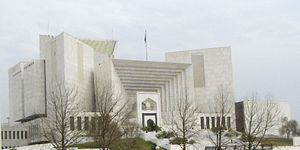After months of championing the cause of accountability for Prime Minister Nawaz Sharif and his family over revelations that emerged earlier this year in the so-called Panama Papers, Pakistanis will now brace for the final verdict over the leaks from the country’s apex court in Islamabad. The leak, which had become a rallying cry for the opposition Pakistan Tehreek-e-Insaaf, managed to polarize the ruling government and the opposition, fomenting considerable political instability internally. To the relief of many, however, the Supreme Court will now decide the fate of those who are to be held accountable for offshore holdings.
In a nation where corruption is pervasive, the fact that the Supreme Court will form a commission to probe the leaks, is a welcoming development for all concerned. The Panamagate Commission will be formed after the TORs or the “Terms of References” are submitted by both the ruling Pakistan Muslim League-Nawaz and the PTI. The five-judge bench was comprised of the chief justice of Pakistan (CJP), Anwar Zaheer Jamali, Justice Asif Saeed Khosa, Justice Sheikh Azmat Saeed, Justice Amir Hani Muslim, and Justice Ijaz Ahsan prior to the PTI’s decision to lock down Islamabad. A one-judge commission will be formed on November 7 to probe the allegations. Notably, the CJP had earlier claimed that Pakistan was being run like a “monocracy,” a thinly veiled reference to the ruling party, the Pakistan Muslim League-Nawaz.
As of this writing, the prime minister has submitted his reply to the apex court by denying the corruption allegations leveled against him. His son-in-law has submitted his TOR along with a disclosure of the assets and liabilities of his wife, Maryam Nawaz. The set of petitions that the CJP has to contend with deal with the disqualification of the prime minister; a government plea against the decision to curb the powers of the prime minister has also been rejected. Notably, the formation of the Panamagate Commission does not necessarily have to be based upon the TORs that the ruling government and the opposition submit. In fact, a lack of consensus over how to proceed gives the court the option to prepare its own terms of reference, which raises hopes for across-the-board accountability.
Developments, which could unfold next week, hint at how the Supreme Court is at center stage for all stakeholders concerned, particularly after cries for accountability were met with violence and the imposition of Section 144 in the capital. The verdict will also prove to be decisive for those who wish to maintain the status quo as well as for those who claim that accountability over the Panama Leaks is imperative for the smooth functioning of democracy in the country. The latter holds true for the PTI, with their clear references to financial corruption taking place under the watchful eye of the prime minister.
The outcome of the verdict notwithstanding, the Supreme Court being at the center stage of a country with a history of military coups and dictatorships is a welcome development.
Hamzah Rifaat was a 2016 South Asian Voices Visiting Fellow at the Stimson Center and has represented Pakistan as a member of the CTBTO Youth Initiative of 2016 in Vienna.































